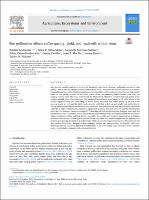| dc.contributor.author | Aristizábal, Natalia | |
| dc.contributor.author | Mora-Mena, Silvia E | |
| dc.contributor.author | Martinez Salinas, Alejandra | |
| dc.contributor.author | Chain Guadarrama, Adina | |
| dc.contributor.author | Castillo, Danny | |
| dc.contributor.author | Murillo, Juan B | |
| dc.contributor.author | Porras, Jimmy | |
| dc.contributor.author | Ricketts, Taylor H | |
| dc.date.accessioned | 2024-09-27T15:45:04Z | |
| dc.date.available | 2024-09-27T15:45:04Z | |
| dc.date.issued | 2025-01-01 | |
| dc.identifier.uri | https://repositorio.catie.ac.cr/handle/11554/12678 | |
| dc.description.abstract | Bees provide valuable pollination services by increasing crop yields. However, pollination services to crop quality – which often determines nutritional and financial value – have been less studied, particularly in tropical commodities such as coffee. Understanding how pollination affects coffee quality is critical because high-quality coffee on the specialty market fetches higher prices, which can potentially benefit farmers more than just focusing on yield alone. This study aimed to test the effects of bee pollination on coffee yield and quality and to evaluate possible trade-offs within them. We conducted bee-exclusion experiments on 30 coffee plants in the Tarrazú region of Costa Rica, controlling for several factors associated with coffee quality. At the end of the growing season, we harvested the berries and compared yield (that is, fruit set and weight) and quality (that is, the cup profiles of certified coffee tasters) among treatments. Our results indicate that bee pollination can lead to trade-offs in coffee production. Bee pollination significantly increased final fruit set by 9 % and the desired aroma scores by 2 %. However, these fruits weighed 7 % less than self-pollinated berries and displayed more body but less balance in their cup profiles. This is one of the first experimental studies to evaluate pollination services for coffee, considering not just yield but also its cup profile. We provide early evidence suggesting bee pollination improves coffee aroma, a critical quality attribute in specialty coffee. Our research emphasizes the importance of protecting or restoring bee habitats in coffee farms, which can not only improve income for coffee producers but also conserve biodiversity. Integrating these ecological insights into initiatives like ’bee-friendly’ coffee production presents an innovative approach for stakeholders in the coffee supply chain and can serve as a strategic nexus of agricultural, economic, and ecological interests. | es_ES |
| dc.format.extent | 8 páginas | es_ES |
| dc.language.iso | en | es_ES |
| dc.relation.ispartof | Agriculture, Ecosystems & Environment | es_ES |
| dc.relation.uri | https://doi.org/10.1016/j.agee.2024.109258 | es_ES |
| dc.subject | Agroecología||agroecology||undefined||agroécologie | es_ES |
| dc.subject | Biodiversidad||biodiversity||biodiversidade||biodiversité | es_ES |
| dc.subject | Coffea arabica||Coffea arabica||Coffea arabica||Coffea arabica | es_ES |
| dc.subject | Calidad del cultivo||crop quality||undefined||qualité des récoltes | es_ES |
| dc.subject | Servicio de los ecosistemas||ecosystem services||undefined||services écosystémiques | es_ES |
| dc.subject | Polinización||pollination||polinização||pollinisation | es_ES |
| dc.subject | Apicultura||apiculture||apicultura||apiculture | es_ES |
| dc.subject | Costa Rica||Costa Rica||Costa Rica||Costa Rica | es_ES |
| dc.subject | Cup profile | es_ES |
| dc.subject | Nature contributions | es_ES |
| dc.subject | Tarrazú -- Costa Rica | es_ES |
| dc.subject.other | Sede Central | es_ES |
| dc.title | Bee pollination affects coffee quality, yield, and trade-offs within them | es_ES |
| dc.type | Artículo | es_ES |
| dc.identifier.status | openAccess | es_ES |
| dc.subject.sdg | ODS 15 - Vida de ecosistemas terrestres | es_ES |


